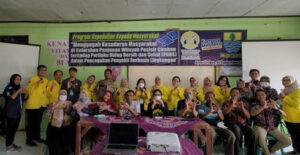
Environmental hygiene will greatly affect the health of humans around it. Therefore, a dirty environment can cause various diseases or what is commonly called environmental diseases. Types of environmental diseases include dengue fever, malaria, upper respiratory tract infection, diarrhea, pulmonary tuberculosis, skin diseases, worm infection, leptospirosis, and filariasis. These various diseases can be prevented by clean and healthy living behavior (PHBS).
One of the areas in Indonesia that is vulnerable to enviromental diseases is Panjunan Urban Village, Lemahwungkuk District, Cirebon City. For this reason, students of the Doctoral Program in Biomedical Sciences (PDIB) together with undergraduate students from the Department of Medicine and Biology, Faculty of Medicine, Universitas Indonesia (FKUI ) carried out activities for community awareness in the form of socialization of health education with the theme “Raising Public Awareness in Panjunan, Cirebon Coastal Area towards Clean and Healthy Living Behavior in the Prevention of Environmental Diseases” on Saturday (03/09).
Field Supervisor (DPL) UI Dr. Melva Louisa, S.Si, M.Biomed., said that the application of clean and healthy living behavior in daily life can be an effort to prevent environmental disease infections. PHBS is a set of behaviors that are practiced based on awareness as a result of learning that makes a person, group, or the wider community to care and prioritize health to create a higher quality life.
Furthermore, PHBS can be applied in the household environment, schools, workplaces, health facilities, and public places. The household environment (family) is a unit that plays a very important role in the implementation of PHBS habits. Therefore, increasing public awareness about PHBS is an important step for environmental diseases prevention.
There are 10 indicators in the implementation of PHBS, which are childbirth assisted by health workers, providing babies exclusive breastfeeding, weighing babies and toddlers every month, using clean water, washing hands with soap and running water, availability of healthy toilet, eradicating larvae at home, eating vegetables and fruit every day, doing physical activity every day, and not smoking in the house. Before the socialization began, the community service, which was attended by 100 participants, conducted health checks on each participant. The examination included blood pressure, blood sugar, and multivitamins.

Furthermore, the material presentation was delivered by a PDIB student representative Dr. Rebecca Angka, M.Biomed. The socialization material continued with the examination of water quality and the presence of mosquito larvae in the water, delivered by Anom Bowo Laksono, Ph.D., as the Field Supervisor (DPL). All participants were also invited to re-learn how to wash their hands properly using soap and running water. The hand washing practice was guided by Aurelia from the Bachelor of Medicine Program.
Head of Administration for Coastal Public Health Center Molly Umairi, SKM, S.ST, M.Kes., in his speech, he said the clean and healthy living behavior of the community in Panjunan Village is always routinely photographed every year. “Health cadres in Panjunan have actively participated in being an extension of public health center in reaching residents to carry out health promotions. One of which is about PHBS,” said Molly.

Head of Panjunan Wantori, SE, M.M., expressed his gratitude for the attention and opportunity given by UI in socializing about environmental diseases as well as clean and healthy living behavior. “Hopefully this socialization can be useful and increase knowledge for the community, especially the Panjunan health cadres who are present on this occasion,” he said.



